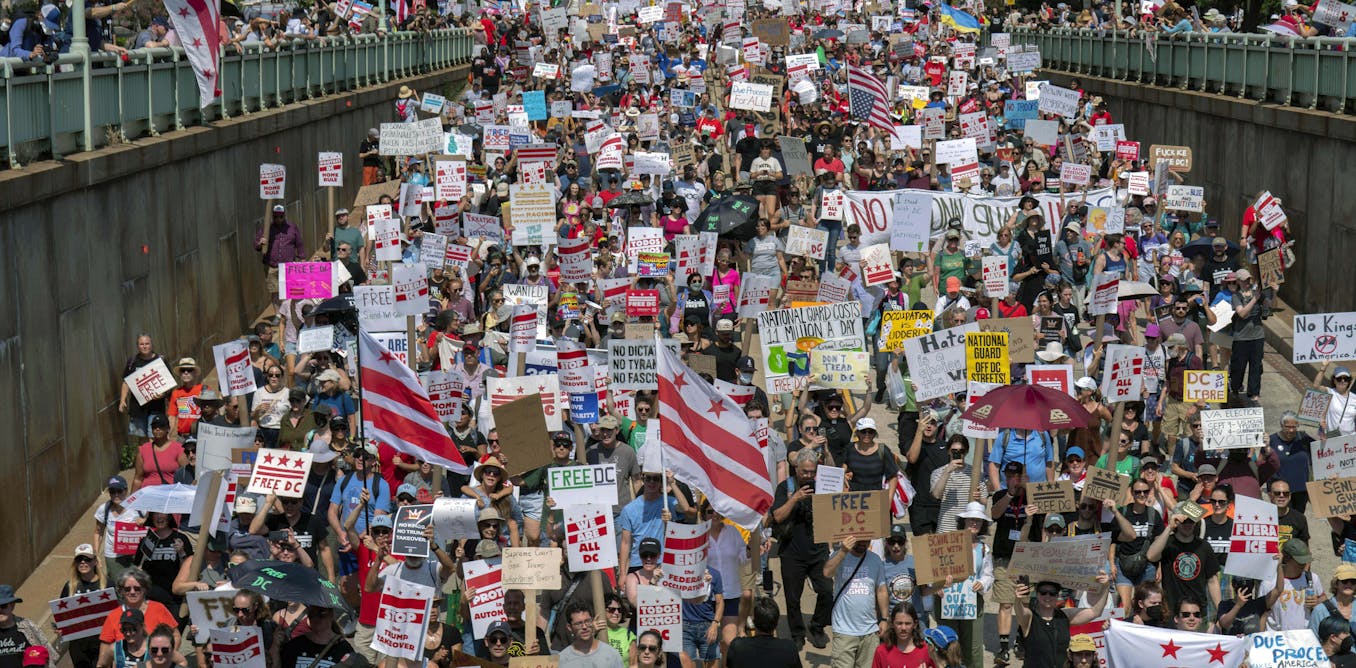The Trump administration has started recruiting hundreds of military lawyers to sit as immigration judges, presiding over what are often life-and-death federal decisions for immigrants in the US, as experts warn the White House strategy is high-risk and arguably unlawful.
The judgeships are temporary, but renewable, and the government’s goal is to fill an acute need for more immigration judges amid Donald Trump’s mass deportation mission – which is now happening even as experienced immigration judges seemingly deemed to have fallen foul of the president’s agenda are being purged from the courts.
Active-duty armed forces officers and reservists, part of the military’s justice arm known as the Judge Advocate General’s (Jag) corps, which has given rise to the lawyers there being nickname ‘Jags’, are getting messages asking them to volunteer for the high-stakes immigration roles.
But experts warn that military lawyers do not have the specialized knowledge to perform the duties of an immigration judge and may only have gotten an hour or two of immigration law training – if that - during JAG school, while, further, their appointments would likely break the law.
“The military’s mission is to kill people and break things — and Jags are trained to support that mission within the boundaries of military law. That’s not the same as immigration law. So why would we be using those attorneys, of all the lawyers out there, to decide the fate of families seeking refuge?” said Shawn VanDiver, a navy veteran and immigration advocate. “It’s just another way the Trump administration is trying to sow fear and keep people from coming here.”
According to the White House and the Pentagon, military attorneys could double the ranks of immigration judges and tackle the overwhelming backlog of 3.75m cases. But their use for civilian immigration enforcement would appear to violate Congress’s laws, namely the Posse Comitatus Act, and the executive branch’s own regulations, experts say.
In fact, in a resurfaced Reagan-era memo, even Samuel Alito, now one of the most conservative justices on the US Supreme Court, recognized that “if military lawyers functioning under the usual military chain-of-command were assigned on a part-time basis to perform civilian law enforcement functions along with their regularly assigned military duties”, it would pose “serious questions” legally.
He strongly advised against such attorneys making a personal appearance in court.
Similarly, Democrats on the Senate armed services committee have said they’re “extremely disturbed” about the scheme and its impact on the Jags’ ability to do their real jobs, if they’re being diverted to the immigration courts.
“I don’t quite understand what their end game is here,” said Margaret Stock, an immigration lawyer and retired Lt Col in the military police, US army reserve. “Unless they’re just trying to send a message that they’re militarizing justice in America, and somehow that’s gonna scare people.”
The Guardian sought comment from the Pentagon, but was referred to the Department of Justice (DoJ), which did not respond to a similar request.
The anticipated military assignments come after the DoJ’s executive office for immigration review (EOIR) – which houses the immigration courts – relaxed rules last month so that any lawyer can now serve as a temporary immigration judge. Officials say they no longer believe that restricting appointees to those “with a threshold level of immigration law experience serves EOIR’s interests”.
VanDiver is alarmed.
“You used to have to prove that you sort of had the chops to be a temporary immigration judge. They’ve taken away all of those requirements now, and it’s literally any attorney that Donald Trump decides, ‘eh, maybe that guy can be deciding somebody’s fate forever’,” VanDiver said.
The service members who take on temporary immigration judgeships are expected to receive some training in immigration law, but not nearly enough to responsibly fill the roles, experts said.
Immigrants and asylum seekers appear before the immigration courts for many reasons, including to make their case for protection, attain lawful permanent residence or press pause on their proceedings while they pursue other immigration relief. But generally, people are before a judge because they are fighting their removal to their home country – or a third country that will take them.
The staggering backlog of cases waiting for adjudication has ballooned since the first Trump administration, amid widespread foreign government repression, natural disasters, failing economies and other factors in other countries across the globe that have forced people to flee across international borders in search of safety and opportunity.
The Biden administration regularly declared the US’s immigration system “broken” and, early on, tried measures to relieve pressure on the court system, but those were largely abandoned later in his term. Still, advocates and some Democrats have frequently lamented the US Congress’s failure to pass legislation allowing longterm, law-abiding immigrants to more swiftly legalize their immigration status instead of languishing in the court backlog as their cases go stale.
Meanwhile, immigration judges who had already been trained and were actively presiding over dockets have been forced off the bench in recent months, many seemingly because their judicial philosophies did not align with the administration’s priorities.
In New York, where two judges were recently terminated, one of them had the highest rate in the city for granting asylum, while the other had been an outspoken critic of Immigration and Customs Enforcement (Ice). Seven adjudicators have been fired in San Francisco, including the top immigration judge and the three with the highest asylum grant rates there. Similar ousting has played out around the country, including in Chicago and the Boston area — suggesting a focus on gutting the courts in Democratic states and sanctuary cities.
More than a hundred immigration judges have left or been fired since Trump returned to the White House.
“Even on Friday [September 5], they were firing qualified immigration judges who were sitting on the bench, and now they’re claiming that they need these Jags to come in and take their place, which doesn’t make any sense,” Stock said. “The only thing I can think is somehow they think the Jags are just gonna order everybody deported immediately. You know, they’re not going to pay any attention to the law. And so they’re trying to bring them in in some kind of measure to try to accelerate deportations.”
After news broke that up to 600 military attorneys would be appointed as temporary immigration judges for 179-day, renewable assignments, Corey Lewandowski, a long-time Trump affiliate and current senior adviser to Kristi Noem, the homeland security secretary, wrote on social media, “I see more deportations of illegal immigrants in the near future.”
As the commander-in-chief, Trump holds outsized sway with the military, and observers believe that Jags making decisions contrary to the administration’s mass deportation campaign could risk damaging their careers – as temporary immigration judges and beyond. But VanDiver has heard from service members that on the topic of the immigration courts and other recent uses of the military for immigration enforcement “they don’t want to do this and they know that it’s wrong”.
“They know that it’s not in keeping with our American values. They know that these missions are just the result of fever dreams of an American dictator,” he said.
For those and other reasons, Jag corps members who take their oaths of office seriously may not be easily coerced into rubber stamping deportations, even as they’re put in an impossible situation, experts said.
“People could be sent back to their home countries and face torture, persecution, death, imprisonment,” said Jeff Joseph, president of the American Immigration Lawyers Association. “I would be very uncomfortable, with two weeks of training, to go in and make these kinds of decisions.”
Nor will the service members necessarily make a dent in the overall backlog of immigration cases, given the likelihood of mass appeals challenging their potential mistakes, jurisdiction and authority.
“All of these cases are going to be appealed for legal error and other issues if the judges are not trained,” Joseph said. “So you’re just shifting one backlog to another.”
In the end, he said, the question is: “Are we really militarizing the immigration court?”

 German (DE)
German (DE)  English (US)
English (US)  Spanish (ES)
Spanish (ES)  French (FR)
French (FR)  Hindi (IN)
Hindi (IN)  Italian (IT)
Italian (IT)  Russian (RU)
Russian (RU)  2 hours ago
2 hours ago
























Comments